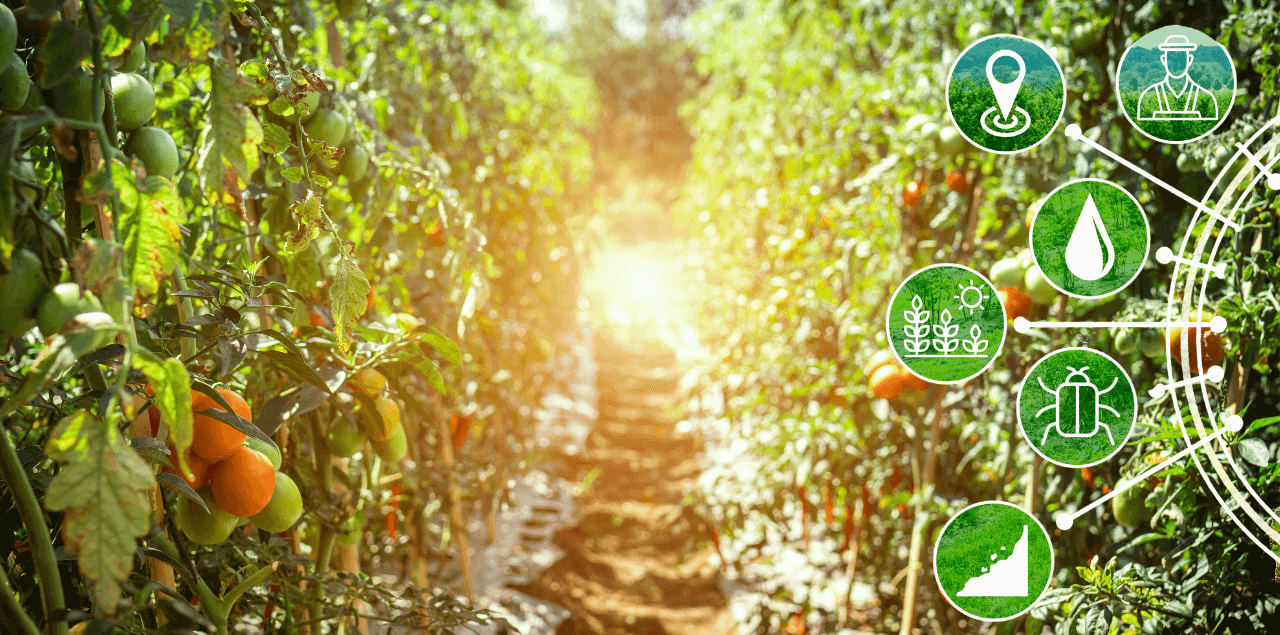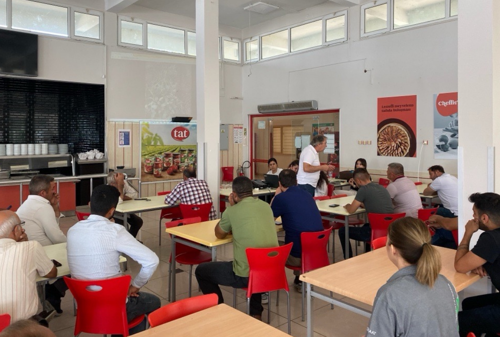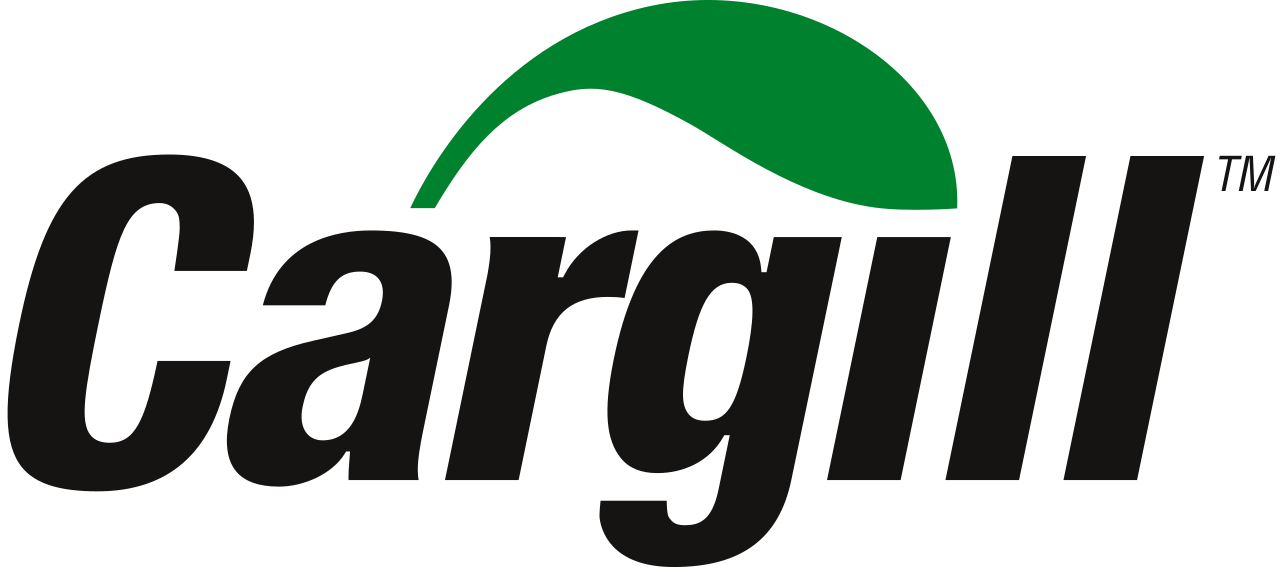
“Digitally transforming agricultural practices among contracted tomato farmers.”
“Digitally transforming agricultural practices among contracted tomato farmers.”
Company

Location
Bursa, Turkey
Employees
1,000 - 5,000
Industry
Food and Beverage Manufacturing
Website
Key Takeaways:
- Water Replenishment: 900.000 tons of water conserved.
- Input Optimization: Fertilizer use was reduced by 18 kg per decares, and crop protection chemical use was reduced by 20%.
- Yield Enhancement: 500 kg per decares of yield loss was prevented through satellite monitoring.
- Enhanced Farmer Capacity: Over 600 hours of training conducted on-site and online. Educational field visits and agricultural support ensured farmers were well-versed in using the new technologies.
- Procurement Optimization: Tat’s tomato procurement processes were optimized, minimizing reliance on human capital and streamlining operations.
- Strategic Planning: Monitoring, evaluating, and reporting farmer performance facilitated strategic planning aligned with emission goals and Green Deal requirements, reinforcing Tat Gıda’s commitment to sustainability and innovation.
The Tat Digital Transformation Program
Through our partnership with Tat Gıda, the Tat Digital Transformation Program, we've achieved substantial advancements in boosting the productivity of contracted tomato farmers. Launched in the Karacabey and Mustafakemalpaşa regions of Bursa on June 9, 2023, the program aims to provide a comprehensive approach, extending beyond technological support to deliver a full range of services focused on data-driven production management. This is achieved through advanced digital monitoring techniques, data analysis, and program management expertise, overseen by our Climate and Sustainability Initiatives team.
Established in 1967, Tat Gıda has emerged as a powerhouse in the Turkish canned foods industry, boasting a 600.000 tons annual production capacity and holding significant global market share. With a dominant position in tomato processing, Tat Gıda exports to over 40 countries worldwide.
Since 2017, Tat and Doktar have been involved in strategic collaboration, leveraging technology to enhance productivity, optimize resource allocation, and promote sustainable farming practices. Here's how we've transformed agriculture together.
Evolution of Our Partnership
Our collaboration commenced in 2017 with the deployment of CropMap, enabling market intelligence for informed procurement decisions. In subsequent years, we witnessed a progressive evolution, encompassing market studies, sensor installations for real-time monitoring of soil and field conditions, satellite crop monitoring, and a pilot program for data-backed irrigation, pest and disease management, finalizing the initiation of the official transformation program.

After a pilot program in 2021, followed by infrastructural preparations in 2022, the Tat Digital Transformation Program officially started in 2023 with 100 farmers, transforming over 6000 decades into digital fields. By 2024, the partnership aims to digitally transform 65% of Tat's contracted farmers, reflecting a sustained commitment to innovation and growth. Doktar has built a proven digital transformation framework based on a multiyear program management experience.
Digital Transformation Framework
We implemented a comprehensive Digital Transformation Framework, emphasizing technology deployment, gradual transition, and program management. By digitizing production processes, the framework empowered farmers with actionable insights for optimized resource allocation, cost reduction, and enhanced decision-making. Key focus areas included irrigation management, fertilizer optimization, pest and disease control, scouting, and yield monitoring.
Capacity-building initiatives have fostered biodiversity conservation awareness and improved digital and financial literacy among farmers and Tat personnel alike. This holistic approach revolutionizes farming practices and uplifts the agricultural ecosystem by empowering all stakeholders involved.
Furthermore, it's important to emphasize that we carry out the digital transformation process and integrate it into the operations carried out by TAT personnel when interacting with contracted farmers. While digitizing the farmer's process, we ensure that TAT personnel and agronomists check the digitized data and adjust their internal operations accordingly. This collaborative approach guarantees that all stakeholders are actively involved and benefit from the digitalization efforts.
Implementation

-
Digital Soil Analysis: We conducted 173 digital soil analyses to guide farmers in optimizing cultivation practices and provide data for in-kind fertilizer subsidies to be given to farmers by Tat in the 2024 season. .
-
Orbit System Integration: We implemented the Orbit satellite tracking system for 100 farms, for a total land area of 630 hectares. This transformed conventional field management approaches by enabling Tat agronomists to prioritize and optimize their field visits. Through Orbit, they monitored problematic areas weekly and planned their visit routes effectively. This proactive approach ensured that early-detected issues were promptly addressed, resulting in optimized agricultural practices and enhanced farm productivity.
-
Technological Installations: 25 digital sensor stations were installed for selected ‘leader farmers’, who are more inclined to engage with the program. Sensors included 1 Filiz Pro, 24 Filiz, and 10 PestTrap stations. These installations were crucial in not only converting irrigation and pesticide activities into data-driven processes but also for Tat to monitor, record, and report on the inputs and secure the yield potential of each farmer.
-
Education and Support: Farmers and forepersons received both field-based and digital training. The season witnessed over 600 hours of educational field visits and agricultural support, ensuring farmers were well-versed in using the new technologies. Both contracted farmers and Tat Gıda personnel were digitally transformed and started integrating their newly acquired techniques into their operations.
-
Harvest Season Activities: During the harvest period, the program included visits to villages and mechanized harvest sites, offering practical insights into modern farming practices.
After our data science and agronomy team thoroughly analyzed the data collected from farmers and the implemented technologies, our program management team drafted the roadmap for the upcoming seasons, ensuring continuous improvement and adaptation of the program.

The Tat Gıda and Doktar partnership exemplifies a successful collaboration driving digital transformation in agriculture. Through a phased approach encompassing technology deployment, capacity building, and performance monitoring, the program has achieved remarkable results in resource conservation, input optimization, and yield enhancement, ensuring a more efficient and quality production. By embracing innovation and sustainability, Tat Gıda reaffirms its leadership position in the industry, setting a precedent for sustainable, efficient, and technologically advanced agriculture and supporting farmers throughout the production period.

Takeaways
-
900.000 tons of water conserved
-
Fertilizer use reduced by 18 kg per decares
-
Crop protection chemical use reduced by 20%
-
500 kg per decares of yield loss was prevented through satellite monitoring
-
Over 600 hours of farmer training conducted on-site and online
-
Tomato procurement operations were streamlined and optimized
-
Strategic planning conducted, aligned with emission goals and Green Deal requirements


